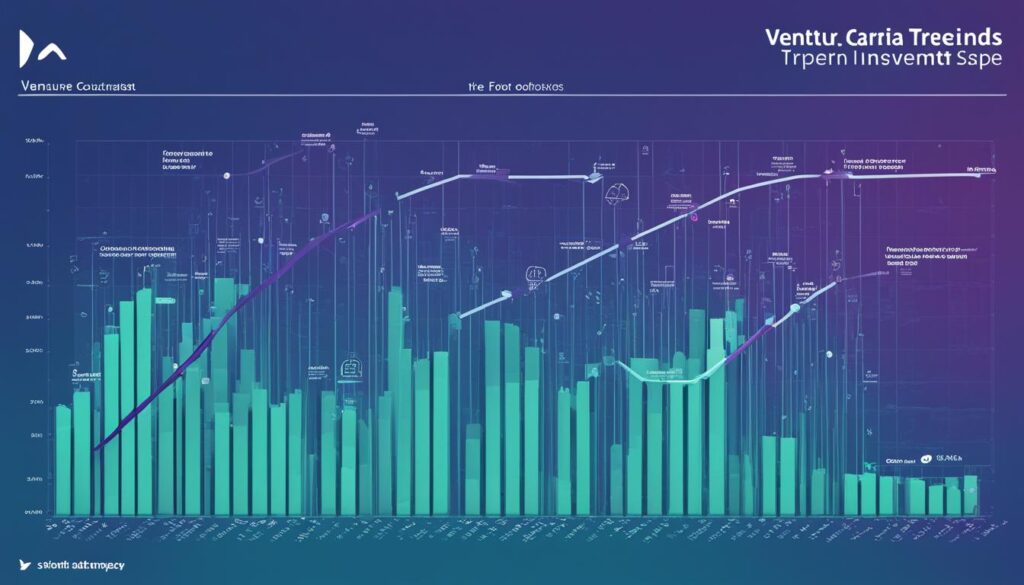As the gig economy continues to transform the workforce, venture capitalists (VCs) are closely monitoring its impact on their investment strategies. The rise of independent contractors and flexible work arrangements has prompted VCs to adapt their approach, seeking to capitalize on the opportunities and address the challenges presented by this evolving landscape. In this article, we’ll explore the key trends, implications, and future outlook of the gig economy’s influence on venture capital.
Key Takeaways
- The gig economy’s growth is driving changes in venture capital investment strategies.
- VCs are seeing a surge in funding for on-demand service providers and sharing economy startups.
- The shift towards flexible work arrangements presents both challenges and opportunities for VC firms.
- Technology is a key enabler of the gig economy, and VCs are investing in innovative workforce solutions.
- Regulatory and legal considerations around the gig economy are important factors for VCs to navigate.
Understanding the Gig Economy
The gig economy is transforming the way we view work and employment. This dynamic landscape is characterized by the rise of independent contractors, freelancers, and workers in the sharing economy, all of whom engage in temporary, contract-based, or on-demand work rather than traditional full-time employment. As businesses and workers seek more flexible work arrangements, the gig economy has become increasingly prevalent, shaping employment trends and workforce changes.
Rise of Independent Contractors
One of the defining features of the gig economy is the growing number of independent contractors. These gig workers, often referred to as freelancers or self-employed individuals, offer their services on an as-needed basis, providing businesses with the flexibility to scale their workforce based on evolving demands. This shift towards a more agile, on-demand labor force has disrupted traditional employment models and presented new opportunities for both workers and employers.
Flexible Work Arrangements
Alongside the rise of independent contractors, the gig economy has also given rise to a wide range of flexible work arrangements. From remote work and part-time jobs to project-based assignments, these alternative employment models are increasingly appealing to both workers seeking greater autonomy and businesses seeking to optimize their workforce. This flexibility has the potential to drive innovation, productivity, and better work-life balance, as the traditional 9-to-5 office job gives way to a more dynamic and adaptable employment landscape.

Venture Capital Investment Trends
Venture capitalists have taken note of the evolving employment landscape and are adjusting their investment strategies accordingly. They have witnessed a surge in funding for on-demand service providers, which leverage technology to connect gig workers with consumers and businesses. Similarly, VC firms have directed significant capital towards sharing economy startups, which often rely on a flexible, freelance workforce to deliver their services.
Growth of On-Demand Services
The rise of on-demand services, powered by technology platforms and gig workers, has captured the attention of venture capitalists. These companies provide consumers and businesses with immediate access to a wide range of services, from transportation and food delivery to home services and professional assistance. Venture capital investment in on-demand service providers has grown exponentially as VCs recognize the potential of this venture capital investment trends and the investment in gig economy.
Funding for Sharing Economy Startups
Venture capitalists have also channeled substantial funding towards sharing economy startups, which often rely on a flexible, freelance workforce to deliver their services. These companies, which facilitate the peer-to-peer exchange of goods, services, and experiences, have disrupted traditional industries and presented new opportunities for investors. The sharing economy startups have attracted significant funding for flexible workforce solutions, as VCs recognize the potential of this evolving on-demand services marketplace.
| Key Trend | Description | Impact on Venture Capital |
|---|---|---|
| Growth of On-Demand Services | The rise of technology-enabled on-demand service providers that connect gig workers with consumers and businesses. | Surge in venture capital investment, recognizing the potential of this venture capital investment trends and investment in gig economy. |
| Funding for Sharing Economy Startups | Venture capitalists channeling significant funding towards sharing economy startups that rely on a flexible, freelance workforce. | Substantial investment in sharing economy startups and funding for flexible workforce solutions, driven by the evolving on-demand services marketplace. |

What impact is the gig economy having on venture capital investments?
The rise of the gig economy has significantly transformed how venture capitalists (VCs) approach their investments. As the workforce shifts towards more flexible, on-demand work arrangements, VCs are recognizing the immense growth potential of companies that cater to the changing needs of both workers and businesses. This employment disruption and workforce transformation have become a key focus for VC firms seeking to capitalize on the evolving economic landscape.
VCs are closely monitoring the investment trends in the gig economy, with a particular emphasis on funding flexible workforce solutions, on-demand service providers, and technology-driven employment platforms. These innovative companies are well-positioned to meet the demands of the new economic reality, where workers increasingly seek greater autonomy and work-life balance, while businesses require more agile and adaptable talent pools.
| Trend | Impact on VC Investments |
|---|---|
| Growth of On-Demand Services | VCs have seen a surge in funding for on-demand service providers that leverage technology to connect gig workers with consumers and businesses. |
| Funding for Sharing Economy Startups | VC firms have directed significant capital towards sharing economy startups, which often rely on a flexible, freelance workforce to deliver their services. |
| Innovative Workforce Solutions | VCs are investing in companies that provide technology-driven solutions to manage and empower the gig workforce, streamlining the process of matching talent with opportunities. |
As the gig economy continues to shape the future of work, venture capitalists are strategically positioning themselves to capitalize on the emerging investment opportunities. By identifying and supporting the innovative companies that are transforming the way we approach employment, VCs can play a crucial role in shaping the workforce transformation and the long-term impact of the gig economy on venture capital investments.

Employment Disruption and Workforce Transformation
The rise of the gig economy is significantly disrupting traditional employment models, as more workers embrace flexible, on-demand work arrangements. This seismic shift in the workforce presents both challenges and opportunities for venture capitalists.
Gig Workers and Traditional Employment
The growing population of gig workers, including independent contractors and freelancers, is challenging the long-held notion of full-time, permanent employment. Venture capitalists must navigate the complexities of this new landscape, where worker classification debates and benefits considerations have become pressing issues.
Challenges and Opportunities
While the gig economy poses risks, such as legal ambiguities and the lack of standard employee benefits, it also opens up new avenues for investment in innovative workforce solutions. Venture capitalists are recognizing the growth potential of companies that cater to the changing needs of workers and businesses in this evolving economic landscape.
Agile, technology-driven platforms that connect gig workers with on-demand opportunities are attracting significant VC attention, as are startups that offer comprehensive benefits and support for the flexible workforce. This shift in investment focus reflects the venture capital industry’s adaptation to the employment disruption and workforce transformation driven by the rise of gig workers and the evolving challenges and opportunities of the gig economy.

Technology’s Role in the Gig Economy
The gig economy’s rapid growth has been fueled by the rapid advancements in technology in the gig economy. Digital platforms, mobile apps, and innovative workforce automation solutions have all played a pivotal role in enabling the flexible, on-demand work arrangements that define the gig economy. Venture capitalists have recognized the immense potential in this technological transformation, directing significant investments towards companies that leverage digital platforms and app-based services to connect gig workers with clients and streamline workforce management.
From ride-sharing apps that match drivers with passengers to online marketplaces that facilitate freelance work, technology has revolutionized the way we think about employment. Venture capital firms have been quick to capitalize on this shift, funding startups that are automating workforce management and developing innovative solutions to meet the evolving needs of both businesses and gig workers.
| Key Technology Trends in the Gig Economy | Venture Capital Investment Opportunities |
|---|---|
|
|
As the gig economy continues to evolve, venture capitalists are keeping a close eye on the technological innovations that are shaping this dynamic landscape. By investing in companies that are driving advancements in digital platforms, workforce automation, and app-based services, VCs are positioning themselves to capitalize on the ongoing transformation of the workforce and the growing demand for flexible, technology-driven employment solutions.

Regulatory Landscape and Legal Implications
As the gig economy continues to expand, the regulatory landscape and legal implications surrounding worker classification, tax obligations, and benefits provision have become increasingly complex. Venture capitalists must navigate this evolving terrain, as their portfolio companies may face legal and compliance issues related to the treatment of gig workers.
Worker Classification Debates
One of the central debates within the gig economy centers around the classification of workers as either employees or independent contractors. This distinction holds significant legal and financial implications, as it determines a worker’s eligibility for certain benefits, protections, and tax responsibilities. Venture capitalists must stay informed on the latest regulatory developments and court rulings that shape the worker classification landscape, ensuring their investments remain compliant.
Tax and Benefits Considerations
The rise of the gig economy has also brought about challenges related to tax obligations and benefits provision for workers. Gig workers often operate in a gray area, with uncertainty surrounding their status as independent contractors or employees. Venture capitalists must carefully evaluate the tax and benefits strategies of their portfolio companies, ensuring they adhere to relevant gig economy compliance regulations and offer appropriate support to their flexible workforce.
| Key Regulatory and Legal Considerations for Venture Capitalists in the Gig Economy |
|---|
|
By staying informed on the regulatory landscape and legal implications of the gig economy, venture capitalists can make more strategic investment decisions, mitigate potential risks, and support the growth of their portfolio companies in this dynamic and ever-changing business environment.

Impact on Traditional Industries
The rise of the gig economy has had a significant impact on traditional industries, disrupting established norms and challenging conventional business models. Two sectors that have been particularly affected are transportation and hospitality/accommodation.
Disruption in Transportation
The emergence of ride-sharing services like Uber and Lyft has transformed the transportation industry, challenging the dominance of traditional taxi companies. These app-based platforms have leveraged the gig economy’s flexible workforce to provide on-demand transportation services, often at lower prices compared to traditional taxis. Venture capitalists have recognized the growth potential of these transportation disruption companies, pouring significant investments into their expansion and technological development.
Hospitality and Accommodation Sectors
Similarly, the hospitality and accommodation sectors have been disrupted by the rise of short-term rental platforms like Airbnb. These gig economy-driven solutions have allowed individuals to easily list and rent out their properties, effectively competing with traditional hotel and motel offerings. Venture capitalists have been quick to recognize the potential of these innovative hospitality and accommodation sectors and have directed substantial investments towards these disruptive platforms.
The impact of the gig economy on traditional industries has been profound, as it continues to challenge established business models and create new avenues for venture capital investments. As these transportation disruption and hospitality and accommodation sectors evolve, venture capitalists are closely monitoring the trends and positioning themselves to capitalize on the ongoing gig economy disruption.
Future Outlook for the Gig Economy
As the gig economy continues to evolve, venture capitalists like myself are closely monitoring the projected growth and investment opportunities it presents. With the increasing acceptance of flexible work arrangements and the ongoing technological advancements that enable the gig economy, VCs are positioning themselves to capitalize on the industry’s expansion and identify promising startups that can meet the changing needs of workers and businesses.
Projected Growth and Investment Opportunities
The gig economy growth shows no signs of slowing down. In fact, industry experts predict that the workforce trends toward more flexible, on-demand work will only continue to accelerate. This presents a wealth of investment opportunities for venture capitalists who are attuned to the future outlook of the gig economy.
I’m particularly excited about the potential for innovative workforce solutions that leverage technology to connect gig workers with clients, automate workforce management, and deliver cutting-edge app-based services. These types of solutions not only cater to the changing needs of the modern workforce, but they also hold significant venture capital strategies for driving growth and disrupting traditional industries.
